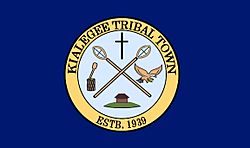Kialegee Tribal Town facts for kids

Kialegee tribal flag
|
|
| Regions with significant populations | |
|---|---|
| Languages | |
| English, Muscogee Creek | |
| Religion | |
| Protestantism (Indian Baptist), traditional tribal religion |
|
| Related ethnic groups | |
| other Muscogee (Creek) peoples: Alabama, Coushatta, Miccosukee, Muscogee (Creek) Nation, and Seminole |
The Kialegee Tribal Town is a Native American tribe. It is officially recognized by the US government. They live in Oklahoma. Long ago, they were part of the Muscogee Creek Confederacy in the southeastern United States. Kialegee people are proud of their traditions. Many still speak the Muscogee language. The name "Kialegee" comes from a Muscogee word. It means "head left."
Contents
Kialegee Culture and Traditions
The Kialegee people celebrate an annual event. It is called Kialegee Nettv (Day). This gathering celebrates their history and culture. It is a special time for town members and visitors.
The History of Kialegee
Kialegee started as its own town. It came from a larger Creek town called Tuckabatche. This town was located along rivers in what is now Alabama. Kialegee then formed two new towns. These were Hutchechuppa and Achinahutchee.
Before the forced relocation, the Muscogee Confederacy had about 50 towns. The Kialegee people had a matrilineal kinship system. This means family lines were traced through the mother. Children were part of their mother's clan. They received their social standing from her family.
The Kialegee community was based on farming. Women and children grew many different crops. They also gathered roots, berries, and nuts. Men hunted for animals or caught fish.
Treaties and Relocation
On June 29, 1796, Kialegee leaders signed a peace treaty. This treaty was with the new United States. But within ten years, the town joined the Red Stick Upper Creeks. This was during the Creek Civil War. The Red Sticks were traditionalists. They fought against the Lower Towns. Lower Towns had more contact with European-Americans.
In 1813, US troops burned Kialegee. Kialegee representatives signed more treaties. These were in 1814, 1818, 1825, and 1826. They gave up some of their lands. Finally, 166 Kialegee families were forced to move. This happened in 1835. They moved to Indian Territory after the Indian Removal Act.
The tribe settled south of what is now Henryetta, Oklahoma. They kept a special ceremonial ground. They played stickball against the Alabama-Quassarte Tribal Town. By 1912, their ceremonial ground was no longer active. An ethnologist named John R. Swanton visited the town. He wrote that Kialegee was a Red Town. This meant it was a community of warriors.
Modern Tribal Government
In 1936, the Oklahoma Indian Welfare Act was passed. This law helped Native American tribes restart their own governments. The US government offered each Muscogee Creek town a chance. They could become an individual tribe. They could set up their own government.
Out of more than 40 towns, only three accepted. These were Kialegee, Thlopthlocco, and Alabama-Quassarte.
The Kialegee tribe approved its constitution and rules. This happened on June 12, 1941. The tribe is led by a mekko. This is like a town king. Other leaders include the First Warrior, Second Warrior, Secretary, and Treasurer. The first tribal office was in Martin Givens' home.
Understanding the Kialegee Tribal Flag
The flag of the Kialegee tribe has a sky blue circle. Inside the circle are two stickball sticks. These are used in a traditional game. The game is still played at ceremonial grounds today.
A black cross is at the top. It represents the Christian religion. To the left is a hollowed log and a beater. Women used these to grind corn meal. Corn was a very important food for Muscogee people.
At the bottom is a ceremonial lodge. It has a rounded bark roof. This lodge was built on an earthwork mound. It was the center of the tribal town. It was used for religious and community gatherings. It also gave shelter to those in need. The earthwork mound shows the Mississippian culture heritage. This culture built large mounds. The bald eagle on the right is a sacred animal. It appears in many tribal stories.
Kialegee Economic Development
The Kialegee Etvlwv Business Committee runs several businesses. These include a daycare, a gas station, and a smoke shop. The Kialegee Tribal Town also has its own housing division. In 2008, the tribe's economic impact was over $1 million.
In 2011, Kialegee Tribal Town planned to build a Red Clay Casino. This was in Broken Arrow, Oklahoma. The National Indian Gaming Commission reviewed the project. Local people and businesses were against it. The Red Clay Casino plan was stopped by a court order in 2012.
Later, in 2017, there was discussion about another Kialegee project. This was for an Embers Grille restaurant. It was on land in Broken Arrow. A possible Red Creek Casino was also mentioned. The Muscogee (Creek) Nation warned against illegal gaming there. They said the Kialegee tribe did not control that specific land. An attorney for Kialegee said they would resist interference.

